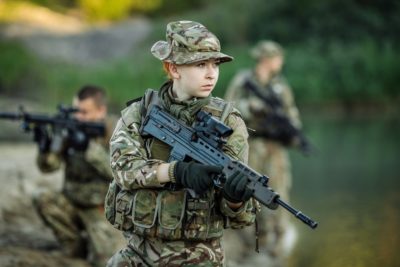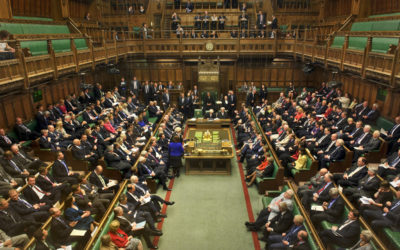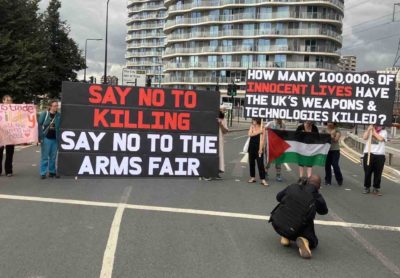Scuppering access to justice for women in the armed forces

Over the coming weeks, the House of Lords will debate a range of new legislation put forward in the Armed Forces Bill, along with a series of amendments. It is expected that some of the additional proposals will get significant support, not least because of the recent publication of a damning report on the experience of women in the armed forces from a parliamentary Defence sub-committee.
The armed forces are not alone in having systemic problems with sexism and sexual harassment and assault, as recent events within the police have made clear beyond doubt. Rigid chains of command, tendency towards reactionary views, and use of force as a modus operandi, make entrenched institutional and individual bias, and negative behaviour towards women and other groups, particularly difficult to challenge.
One of the common features of all the institutional abuse that has come to light in recent years is the cover up that takes place to protect both the perpetrator and the institution. Within the armed forces, this stretches from cases currently making the news, such as the suicide of a female cadet at Sandhurst military academy and the killing of a Kenyan woman by British soldiers, to older cases, such as the historic (and recent) abuse in the cadet forces reported by the BBC in 2017.
Years of piecemeal reform and lip service to equality concerns has not yielded adequate shifts in underlying approaches from the armed forces. Accepting women on the basis that they are able to adapt to male-dominated institutions, which seems to be the subtext of the army’s recent ‘A soldier is a soldier’ advertising campaign, is no longer enough.
Tackling the problem requires political will. Unfortunately, not only is the need for legislation to challenge sexual harassment in public spaces being denied by the Prime Minister, but his government is failing to listen to the many voices calling for a radically better system for those who have experienced sexual violence in the military.
An opportunity for change
The Armed Forces Bill passes through Parliament every five years, introducing and modifying legislation related to the UK armed forces. It provides the legal basis for the armed forces but can also legislate for, and change, structures and provision across the three services, and how they relate to civil society. With the government’s heavy and worrying legislative programme, the Armed Forces Bill 2021 has not been given much public scrutiny despite its proposals to create a legal obligation to the military for public authorities under the Armed Forces Covenant.
The Bill has provided the opportunity to debate a number of amendments that could lead to progressive change in how the armed forces operate. These include raising the age of recruitment to 18 and introducing an armed forces federation, which would represent the interests of serving personnel on matters such as welfare and remuneration.
A key change to the military justice system has also been put forward which would see serious sexual offences as well as murder and manslaughter investigated and prosecuted within the civilian rather than military justice system. However, with the Tories dominating the committee scrutinising the Bill, and the Commons, none of these progressive amendments have gained significant support.
Meanwhile, the Defence Sub-Committee on Women in the Armed Forces reviewed scores of witnesses and thousands of survey respondents for its ground-breaking report. The Defence Instruction Notice that prohibits personnel from speaking to Parliament was temporarily lifted and an unprecedented number of female personnel, as well as many who have left the military, responded to the call for evidence. Covering numerous concerns, from ill-fitting uniforms and equipment to inequalities around career progression to the endemic nature of sexual harassment, the report concluded that, ‘Within the military culture of the Armed Forces and the MOD, it is still a man’s world.’ Some of the details of individual experience makes for shocking reading.
The inquiry grew out of a #militarymetoo campaign sparked by retired Lieutenant Colonel Diane Allen who describes the ‘toxic pairing’ of misogyny from senior leaders and dinosaur attitudes, and the ‘weak systems for investigating complaints, delivered by heavy-handed military lawyers and often incompetent service police’. She goes on to say that, ‘this second toxic pairing is allowing a small group of sexual predators to thrive’. Finally, the better military leaders to do not have tools to challenge poor behaviours.
The experience for women in the armed forces
While the Women in the Armed Forces inquiry represents the first time the experience of female personnel has been examined in detail in public in this country, it is far from the first time that many of the concerns have been raised, particularly those relating to sexual harassment and assault.
Over the last ten years external pressure, from Liberty’s Soldier’s Rights campaign to the Centre for Military Justice, and a series of internal surveys and reviews into sexual harassment and ‘inappropriate behaviours’, has built up a picture of harassment as a common experience for women in the armed forces. The last Sexual Offences in the Service Justice System report indicated that 153 investigations took place during 2018 for offences under the Sexual Offences Act 2003. The majority of victims were women. Yet this is likely to be a conservative reflection of actual assaults as these figures only include offences that were reported.
On top of this, women have to overcome the obstacles presented by the chain of command and the fear of speaking out, and then face the service complaints system. The Centre for Military Justice state that, ‘All of our clients report some form of re-traumatisation as a consequence of the service complaints process.’ The report notes that since the system was first introduced in 2016 the Service Complaints Ombudsman for the Armed Forces has never judged the internal service complaints system to be efficient, effective and fair’. Women and BAME personnel have been significantly over-represented in complaints each year.
The MoD’s Lived Experience report of 2019 would have given sufficient narrative detail of the difficulties faced by women personnel. The Lyons and Wigston reviews had already recommended some of the changes called for by the Women in Armed Forces report – improving the service justice system, the complaints system and reducing instances of inappropriate behaviour. The first recommendations made by Lyons are that the most serious offences are prosecuted by civilian authorities.
The Women in the Armed Forces report discusses the lack of provision for dealing with military sexual trauma. Support for female veterans is offered by Salute Her, a service established by Forward Assist, who gave insightful evidence on the particular characteristics and effects of sexual trauma within the military context. The Centre for Military Justice states that military approaches to handling sexual assault cases ‘are not trauma informed and there is little to no understanding of the impact on the victim.’ The report says that while the term military is used in other countries, such as the US and Canada, ‘the MOD told us it has not formally decided to use the term of military sexual trauma’.
The report recommends that, ‘the MoD should recognise military sexual trauma and fund greater provision of female-specific, specialist support services for veterans with in-service experiences of sexual harassment, assault and rape.’ Forward Assist made the same recommendation in their submission to the Armed Forces Bill committee.
So far in 2021 there have been ten reports of rape and sexual assault, or one for every 29 girls. The Times, 18/10/2021
Sexual assault of girls in the military – those recruited at 16 and 17 years of age – was noted as a concern but is yet to be given significant recognition, given that the youngest recruits have additional vulnerabilities and safeguarding needs. They are also particularly likely to be intimidated by raising a complaint and seeing it through. Yet recent figures show that there has been 41 cases of sexual assault on 16 and 17 year old girls since 2015:
‘With an average of 215 girls under 18 serving between 2015 and 2020, it is said to be equivalent to one report for every 40 girls. This makes girls in the armed forces more than twice as likely as their civilian counterparts to report a rape or sexual assault to police’.
These figures do not indicated the level of everyday harassment these girls face, and there is no research that looks at this issue by age. The report made clear that future sexual harassment surveys must capture how it affects under-18s.
Voting against their own recommendation
The sub-committee for the Women in the Armed Forces inquiry was chaired by the Conservative MP Sarah Atherton, who has herself served in the army. She strongly endorsed the report’s recommendations in the press, stating that ‘military women are being denied justice’ and wrote the following in a 2020 article entitled ‘Sexual abuse in the armed forces should not be prosecuted by the military’:
‘[T]here are many narratives which show someone subjected to sexual assault in service would be less likely than their civilian equivalent to have a confidential and balanced investigation; less likely to have their persecutor convicted; less likely to receive appropriate support and more likely to develop longer term trauma as a result of their experiences. It is widely viewed that having civilian authorities investigating and deciding on service sexual assault cases would go some way to level this inequality’.
Yet, when an opportunity arose to implement the recommendation that serious sexual assault in the military is prosecuted by civilian authorities, by supporting the Armed Forces Bill amendment, Sarah Atherton was not present at the debate, effectively abstaining from the vote.
Other Conservative MPs on the sub-committee that produced the report, including Tobias Ellwood MP, also chair of the Defence Committee, voted down the amendment to move the most serious crimes – murder, manslaughter, domestic violence, child abuse and rape – to the civilian courts. They referred to the government’s rejection of the first recommendations in the Lyons review with the statement that, ‘decisions on which jurisdiction should deal with criminal offending by service personnel will continue to be made by the relevant policing and prosecutorial authorities on a case-by-case basis.’ Without any detailed reasoning behind this, we have to draw our own conclusions; perhaps the likelihood that opening up routine prosecution to the civilian courts would lead to more cases being heard is something the military would like to avoid.
Why would the chair and other members of an inquiry vote against legislation that would implement one of their own recommendations? Perhaps caught between a rock and a hard place – the Tory whip and military defiance – Sarah Atherton can only hope that the armed forces will be embarrassed into change. While serious sexual or domestic violence are far less common than sexual harassment, resistance to change relating to the most serious of cases suggests that the wider culture of sexism, discrimination and inequality laid bare by the Women in the Armed Forces report, will never effectively be addressed.
The MoD has already deferred the tri-service sexual harassment survey, recommended by the Wigston Review, to 2023, and rolled back on its acceptance of the Wigston recommendation for a Defence Authority on culture and behaviours. It rather flippantly told the sub-committee on women in the armed forces that it may take 300 years to improve on the under-representation of women among senior officers. The government’s response to the Women in the Armed Forces report is some weeks overdue at the time of writing. And, in an inexplicable move which is likely to make access to justice even more remote, the government has introduced legislation in the Armed Forces Bill to decrease the time allowed for making an appeal against a decision by the service complaints system from six weeks to two weeks. This has been widely condemned.
Despite the defeat in the Commons, a similar amendment has been introduced to the House of Lords by Lord Thomas of Gresford. He clarified that, far from being a long tradition, the court martial was only given jurisdiction over serious offences in 2006, when the change was introduced by the Labour government. He makes the important observation that in reality no cases of murder have been tried by court martial since then yet the most serious sexual offences now are, and ‘in a highly unsatisfactory way’.
Given lack of resources and poor conviction rates in civilian courts, moving cases to the civilian courts is not a panacea. The consensus amongst all but the government and the military is that it will greatly improve access to justice. Furthermore, unlike murder and manslaughter, crimes that disproportionately affect women are likely to involve repeat offenders and group behaviours. Change to how these crimes are prosecuted would signal that the MoD is serious about ending the culture of impunity which this behaviour relies upon. The military will no longer be able to get away with being seen to do its best to root out a few bad apples, but complicit in a discriminatory and abusive culture.
See more: equality, legislation & policy, risks, UK Parliament, bullying and assault, gender
Like what you read?
> Sign up for our newsletter or blog notifications
> Support our work – from just £2 a month










